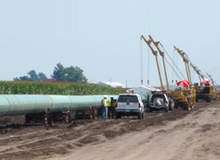
The Rockies Express (REX) project is a new natural gas pipeline that was constructed in the US in 2009. The pipeline was built in three segments and stretches 1,679 miles (2,702km) between the Rocky Mountains in Colorado and eastern Ohio (passing through eight states).
The new gas pipeline cost $5.6bn (the original estimated cost in 2005 was $3bn) and has the capacity to supply about 16.5 billion cubic metres of natural gas a year. The project is one of the largest gas pipelines ever constructed in the US.
Elements of the pipeline vary in diameter between 36in (910mm) and 42in (1,070mm) at various sections. The final sections came onstream in November 2009.
Rockies Express Pipeline partners
The pipeline was constructed by Rockies Express Pipeline LLC, which also operates the entity. Rockies Express Pipeline is a partnership between Kinder Morgan Energy Partners, ConocoPhillips and Sempra Energy. Part of the pipeline system is the Entrega pipeline, which was owned by Entrega Gas Pipeline, a subsidiary of EnCana Corporation. The Entrega pipeline was incorporated into the project when Kinder Morgan Energy Partners and Sempra Energy acquired Entrega Gas Pipeline in February 2006.
ConocoPhillips bought into the project directly, acquiring 24% of the project in June 2006.
Three segments
The REX Entrega section is 328 miles (528km) long and was formerly owned by Entrega Pipeline. The gas line runs between the Meeker Hub (Rio Blanco County, Colorado) and the Cheyenne Hub (Weld County, Colorado). The construction was authorised in August 2005 and the pipeline is in two diameters.
The first 136 mile (219km) section, running from Meeker Hub to Wamsutter Hub in Sweetwater County, Wyoming, is a 36in pipe and has been in operation since February 2006.
The second 192 mile (309km) section, which runs from Wamsutter Hub to Cheyenne Hub, is a 42in (1,070mm) pipe and has been in operation since February 2007.
The REX West section, which is divided into seven spreads, runs 713 miles (1,147km) in a 42in (1,070mm) pipe from Weld County in Colorado to Audrain County in Missouri, near St Louis. The fifth spread of the project runs from Gage County to Doniphan County. Kan was installed by the Latex Construction Co.
There is also a 5 mile (8km), 24in (610mm) branch connecting to the Williams Energy-owned Echo Springs Processing Plant. REX West was approved on 20 April 2007 by the Federal Energy Regulatory Commission (FERC) and the first 503 mile (810km) section was commissioned on 27 December 2007.
The final 214 miles (344km) of REX West was commissioned and operational on 16 May 2008. The final section of the pipeline, REX East, is a 639 mile (1,027km), 42in (1,070mm) pipeline from Audrain County, Missouri, to Clarington, Monroe County, Ohio.
FERC approval for construction to begin was granted on 30 May 2008. This section of the project involves 1,700 plots of land between Missouri and Ohio, 18 of which were acquired using eminent domain (compulsory purchase).
There are seven new compressor stations and 19 meter stations along this section, as well as 13 interconnections to 19 other inter and intra-state pipelines.
To transport the gas towards the north-east, several expansion projects were suggested. A north-east express project that will extend 604km (375 miles) from Clarington and Lebanon, Ohio to Princeton, New Jersey, will be completed by late 2010.
A separate project, Time III, will connect the Rockies Express pipeline with the Texas Eastern Transmission pipeline, which is owned by Spectra Energy.
Scheduled to start by November 2010, this project will expand the annual capacity of the Texas Eastern Transmission pipeline by 4bcm and carry Rocky Mountains gas to Pennsylvania.
Construction of the Rockies Express Pipeline
HC Price Construction was the key contractor on the REX East, working through the 46.7 mile section through Douglas and Edgar Counties towards the Indiana state line (Spread C). Associated Pipe Line Contractors of Houston installed 67.8 miles of pipeline in Indiana (spread D).
The pipeline is mostly buried with a minimum of 5ft of sub-soil cover and the restored topsoil (pipes are therefore about 6ft underground). There is also a 100ft-wide construction right of way, which was reduced to 50ft across the pipeline and permanently maintained.

